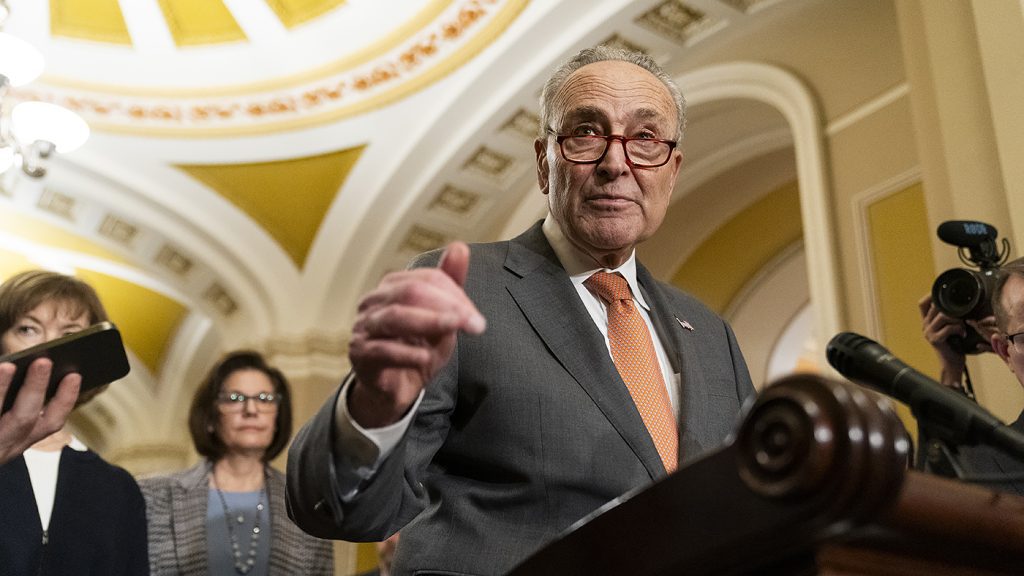The Senate passed a two-year renewal of the Foreign Intelligence Surveillance Act’s (FISA) warrantless surveillance program early on Saturday after lengthy and sometimes bitter debate, narrowly avoiding a crucial national intelligence gathering capability from going dark.
Senators voted 60-34 to send the bill to President Biden’s desk shortly after the midnight deadline for a lapse in expanded surveillance powers.
The law prolongs the government’s ability to monitor foreigners overseas for another two years, which also involves gathering communications of Americans they communicate with.
The bill, known as the Reforming Intelligence and Securing America Act, introduces several changes to FISA Section 702, although it falls short of the expectations of privacy advocates.
“This is not a simple renewal of the existing bill. This is a reform bill that addresses many of the issues we’ve encountered with Section 702,” noted Sen. John Cornyn (R-Texas), a member of the Senate Intelligence Committee, on Friday.
The bill aims to address concerns about FBI misuse of the 702 database by significantly reducing the number of people authorized to approve a query, decreasing it from around 10,000 to just 550. It also introduces a retrospective audit of any queries involving a U.S. person and strengthens the civil and criminal penalties for any misuse of the tool.
It also formalizes some FBI reforms aimed at preventing abuse, with the number of Americans searched in the 702 database having significantly decreased since the agency changed its search portal to no longer automatically include agents in querying 702 data.
“If implemented, the reforms included in this bill would be the most comprehensive set of reforms ever enacted,” said Senate Intelligence Chair Mark Warner (D-Va.).
But some were doubtful that the measures would be adequate.
The debate over the bill revealed the deep divisions within both parties over a 15-year-old program that supporters see as vital to national security and critics argue is a serious violation of Americans’ privacy rights.
FISA’s surveillance program seemed to be on course for a temporary lapse until Senate Majority Leader Chuck Schumer (D-N.Y.) announced a breakthrough on the Senate floor after 9 p.m. on Friday.
“Throughout the day, we persisted in the hope of making a breakthrough, and I am relieved that we achieved it,” Schumer announced on the floor with a sense of relief in his voice.
“Allowing FISA to expire would have been dangerous. It’s a crucial element of our national security toolkit and helps law enforcement prevent terrorist attacks, drug trafficking, and violent extremism,” he said.
Schumer faced strong opposition from within his own caucus, including from Sen. Ron Wyden (D-Ore.), a senior member of the Senate Intelligence Committee, who pledged to “do everything in my power to stop it from passing the Senate.”
Wyden and other critics argued that law enforcement agencies have misused the expanded surveillance power authorized by FISA’s Section 702.
“Searches have increased targeting American protesters, political campaign donors, and even people who just reported crimes to the FBI. The wrongdoing has been extensive and well documented,” Wyden stated to colleagues.
He proposed a change to remove language added in the House that would broaden the types of businesses forced to obey government surveillance requests.
Privacy advocates say the House language is poorly written and will force a wide range of businesses to spy.
But Wyden’s attempt to remove it was unsuccessful, with a vote of 34 to 58.
Schumer also faced opposition from Senate Democratic Whip Dick Durbin (Ill.) who joined forces with Sen. Kevin Cramer (R-N.D.) on a proposal that would have mandated the government to obtain a warrant before reviewing any communications incidentally collected from Americans.
The proposed change was a top priority for privacy advocates, but one that the intelligence community said would undermine the tool and prevent them from acting on information in real time. It failed with a vote of 42 to 50.
The House-approved bill had strong support from members of the Senate Republican leadership team, including Senate GOP Leader Mitch McConnell (Ky.) and Cornyn.
McConnell argued on the Senate floor that the House needed to expand the types of electronic communications covered by the law because when it was first written, “the Internet was in the dark ages.”
Cornyn, a member of McConnell’s leadership team, praised FISA’s expanded surveillance authority as “the most important law that most Americans have never heard of” and “an essential tool for our intelligence community to protect the American people against a whole array of threats.
GOP leaders clashed with conservatives within their conference, such as Sens. Rand Paul (R-Ky.) and Mike Lee (R-Utah), who tried to amend the bill and threatened to extend the debate past Friday’s deadline if they didn’t get a chance to vote on changes.
Paul argued that the FISA program has undermined Americans’ right to due process, while Lee said the House-approved bill had “more problems than a math book.”
“Serious Fourth Amendment violations against U.S. citizens will increase significantly if this bill is passed into law,” Lee cautioned.
Paul proposed a change to prevent intelligence and law enforcement agencies from purchasing Americans’ data from third-party vendors, and a second one to impose strict restrictions on surveilling Americans under the authority of the Foreign Intelligence Surveillance Court.
Both proposals were defeated, with votes of 31 to 61 and 11 to 82, respectively.
Lee proposed a change to require the Foreign Intelligence Surveillance Court to appoint an external lawyer to advocate for the rights of a U.S. person the government wants to surveil secretly. It would have also required government employees appearing before the FISA court to disclose factual evidence that might call into question the accuracy of their statements.
It also failed even though it had previously passed the Senate with 77 votes in 2020.
The broader legislation, which passed the House 273 to 147 a week ago, includes provisions that expand the use of Section 702, including a House-approved change that would permit the use of the tool to vet anyone entering the country as a traveler or migrant.
The sponsor of the provision, Rep. Mike Waltz (R-Fla.) said it would let the government check your background for terrorist activity.
The bill tackled another part of FISA that outlines how to conduct domestic surveillance, added due to the 2016 spying on Trump campaign aide Carter Page.
Unlike Section 702, domestic spying needs a warrant, and the law says law enforcement can't use political opposition research or media reports when asking for a warrant.
This addresses two issues with the warrant to spy on Page, even though a review found that the FBI didn't include evidence against its reason for surveilling him.
Another controversial part of the bill involves notifying some members of Congress about searches involving lawmakers, which critics called protections “for me but not for thee.”
The House approved the bill after 19 GOP members blocked a vote to discuss the legislation, but their move didn't win them any of their policy demands.
The House conservative rebels convinced Speaker Mike Johnson (R-La.) to extend FISA 702 for only two years instead of the original five years in the bill.









